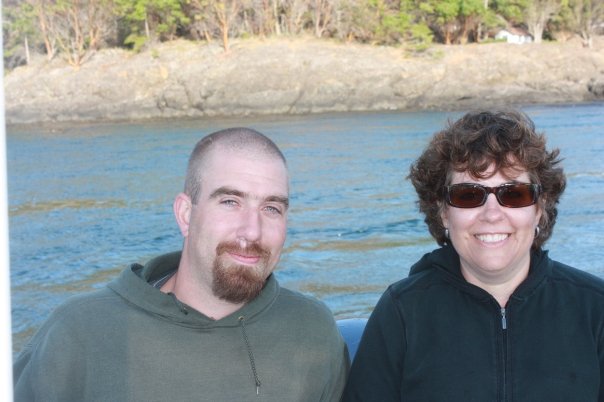MT Senate Set to Vote on Physician Imprisonment Act Opposed by 88% of Voters, New Poll Shows
Feb 17, 2023
Bill would strip dying Montanans of access to a peaceful death, subject doctors who provide medical aid in dying to homicide charges, possible death penalty
(Helena, MT -- Feb. 17, 2023) A new poll shows nearly nine out of 10 Montana voters (88%) oppose a bill that the state Senate could vote on any day, SB 210, which would subject physicians to homicide charges if they honor a request by a terminally ill adult for a prescription for medical aid in dying. Homicide is a felony crime that in Montana carries a minimum sentence of 10 years in prison and a maximum sentence of the death penalty.

TJ Mutchler and his mother Leslie Mutchler in 2009
The new survey of 601 registered voters in Montana conducted Feb. 6-12 by an award-winning GOP firm,
Susquehanna Polling & Research, shows opposition to SB 210 (a/k/a the Physician Imprisonment Act) spans the political spectrum. It includes a majority of self-identified pro-life voters (86%), self-identified pro-choice voters (88%), voters with a disability (94%), firearm owners (89%), self-identified Republicans (89%), self-identified Democrats (87%) and unaffiliated voters (87%).
In addition, the poll shows that 83% of Montana voters support maintaining the legal option of medical aid in dying in Montana and 74% personally want this end-of-life care option, including 66% of pro-life voters.
The poll summary is posted at https://bit.ly/MTaid-in-dyingPollSummary
The poll toplines are posted at https://bit.ly/MTaid-in-dyingPollToplines
The poll crosstabs are posted at https://bit.ly/MTaid-in-dyingPollCrosstabs
The Montana Senate Judiciary Committee approved SB 210 last Thursday in a straight GOP-Democratic party line 7-4 vote.
The Senate narrowly failed to pass the same bill in a tie 25-25 vote in 2021, and the House
easily passed the same bill by a seven-vote margin, 53-46, in 2019 (the most recent years each body considered the legislation). But in November 2022, Montana Republicans won a two-thirds supermajority in both houses,
making defeating this draconian legislation even more difficult.
“This poll proves the overwhelming majority of Montana voters, regardless of their politically divergent views on other issues, oppose this draconian legislation to imprison physicians for honoring their patients end-of-life care wishes,” said Callie Riley, Northwest Regional Advocacy Manager for Compassion & Choices. “National, regional and state polls show medical aid in dying is not a partisan issue. Everyone can relate to this issue because everyone knows they will die one day.”
Medical aid in dying has been authorized in Montana since 2010, as a result of the Montana Supreme Court ruling in a lawsuit, Baxter v. Montana, filed by Compassion & Choices on behalf of a terminally ill truck driver and Marine Veteran, Bob Baxter, from Billings. The court ruled in the case on Dec. 31, 2009, that: “In conclusion, we find nothing in Montana Supreme Court precedent or Montana statutes [which would include the assisted suicide statute enacted in 1981] indicating that physician aid in dying is against public policy … Furthermore, the Montana Rights of the Terminally Ill Act indicates legislative respect for a patient’s autonomous right to decide if and how he will receive medical treatment at the end of his life.”
Sadly, Bob Baxter died the very day the judges ruled in his favor and was unconscious when the phone call came to notify him of the court’s decision. Ironically, eight years later, his 36-year-old grandson, TJ Mutchler, was able to utilize medical
aid in dying to peacefully end his suffering from terminal metastatic pancreatic cancer on Feb. 19, 2017 (see TJ’s story and video here).
“He enrolled with hospice and they tried very hard to control his symptoms, but toward the end, the medications were no longer effective. He had lost 125 pounds since becoming ill. His pain became intolerable and he vomited throughout the day,”
said TJ’s mom and Baxter’s daughter, Leslie Mutchler, a family nurse practitioner in Billings. “I hope none of you ever have to watch your child suffer like mine did with his terminal illness. If
the symptoms become unbearable would you rather be able to gather together and be with them while they pass peacefully with life-ending medication or find them dead in the backyard from a self-inflicted gunshot wound because they did not have that
option? I hope this poll makes our Montana lawmakers see the light, and represent the interests of their constituents, rather than their own interests, and drop this bill.”
Medical aid in dying is reserved for terminally ill adults with six months or less to live, who are mentally capable of making their own medical decisions. In Montana and the other 10 jurisdictions where medical aid in dying is authorized (California, Colorado, Hawaii, Maine, New Jersey, New Mexico, Oregon, Vermont, Washington, and Washington, D.C.), these qualified patients have the option to request a prescription from their doctor for medication they may decide to self-ingest to peacefully end their suffering if it becomes intolerable.


